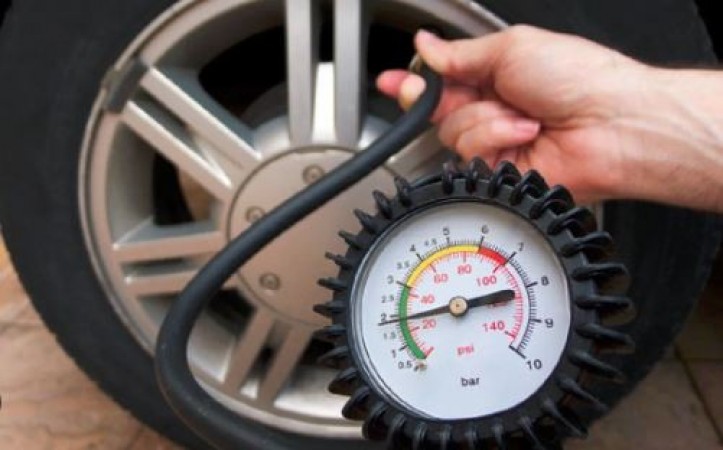
Maintaining the correct tyre pressure is crucial for your safety on the road. Under-inflated or over-inflated tyres can lead to poor handling, increased braking distances, and even tyre blowouts. Ensuring your tyres are properly inflated helps prevent these hazards and keeps you safe.
Did you know that proper tyre pressure can save you money on fuel? Under-inflated tyres increase rolling resistance, causing your car to use more fuel. By keeping your tyres at the right pressure, you can improve your car's fuel efficiency and reduce your trips to the gas station.
Tyres are not cheap, and maintaining the correct pressure can extend their lifespan. Under-inflated tyres wear out more quickly on the edges, while over-inflated tyres wear out faster in the center. Properly inflated tyres ensure even wear, meaning you won't need to replace them as often.
Tyre pressure is the amount of air in your car's tyres, measured in pounds per square inch (PSI). Each vehicle has a recommended tyre pressure, usually found in the owner's manual or on a sticker inside the driver's door.
Checking tyre pressure is simple and should be done regularly. Use a tyre pressure gauge, remove the valve cap from one of your tyres, and press the gauge onto the valve stem. The gauge will give you a PSI reading. Compare this to your car's recommended pressure.
It's best to check tyre pressure when your tyres are cold, as driving heats them up and can give a false reading. Ideally, check your tyre pressure once a month and before long trips.
For most passenger cars, the recommended tyre pressure ranges from 30 to 35 PSI. However, always refer to your car’s manual for the exact recommendation.
SUVs and trucks often require higher tyre pressure due to their larger size and weight. The recommended pressure for these vehicles typically ranges from 35 to 40 PSI.
Performance vehicles may have specific tyre pressure requirements, sometimes even different pressures for front and rear tyres. Check the manufacturer's recommendations for the best performance and safety.
Temperature fluctuations can significantly affect tyre pressure. For every 10°F change in temperature, tyre pressure can increase or decrease by about 1 PSI. Check your tyre pressure more frequently during extreme weather changes.
Carrying heavy loads or towing can affect tyre pressure. If you're planning to carry a lot of weight, adjust your tyre pressure according to the manufacturer's recommendations for loaded conditions.
Different seasons can require different tyre pressures. In colder weather, tyres tend to lose pressure, while in warmer weather, they might gain pressure. Adjust your tyre pressure seasonally to maintain optimal performance.
If your tyres are under-inflated, you can add air at most gas stations or with a home air compressor. Insert the air hose into the valve stem and add air in short bursts, checking the pressure frequently until you reach the recommended PSI.
If your tyres are over-inflated, you can release air by pressing the small pin inside the valve stem with a tool like a screwdriver or a tyre pressure gauge. Let out air in small amounts and recheck the pressure until it matches the recommended PSI.
Some people believe that over-inflating tyres improves performance. However, this can lead to reduced traction and a harsher ride. Stick to the manufacturer's recommendations for the best balance of performance and safety.
Even new tyres can lose air over time. It's important to check tyre pressure regularly, regardless of how new or old your tyres are.
You can't accurately judge tyre pressure just by looking at your tyres. They can appear properly inflated even when they're not. Always use a tyre pressure gauge for an accurate reading.
Proper tyre pressure ensures a smoother and more comfortable ride. Under-inflated tyres can feel squishy and unresponsive, while over-inflated tyres can make the ride harsh and bumpy.
Maintaining the correct tyre pressure improves your car’s handling and stability. Properly inflated tyres provide better grip on the road, making it easier to steer and control your vehicle.
Tyres that are not properly inflated are more susceptible to damage. Under-inflation can cause sidewall damage, while over-inflation increases the risk of impact damage from potholes and road debris.
Invest in a good-quality tyre pressure gauge. Digital gauges are more accurate and easier to read than analog ones. Keep one in your car for regular checks.
Having a portable air compressor can be a lifesaver. These devices allow you to add air to your tyres wherever you are, ensuring you can maintain proper pressure even when you're far from a gas station.
Many modern cars come with a TPMS that alerts you when tyre pressure is too low. While these systems are helpful, they shouldn't replace regular manual checks with a gauge.
Make tyre pressure checks a regular part of your car maintenance routine. Doing so will enhance safety, improve fuel efficiency, and prolong the life of your tyres.
Always follow the tyre pressure recommendations provided by your vehicle's manufacturer. These guidelines are designed to ensure the best performance and safety for your specific car.
Understanding the importance of tyre pressure and knowing how to maintain it will help you avoid many common problems. Stay informed, keep the right tools on hand, and enjoy a safer, more efficient driving experience.
India's Stricter Auto Emission Norms to Increase Car Prices, Here's What You Need to Know
EU Imposes Additional Tariffs on Chinese Electric Cars to Level Playing Field
Mahindra BE.05 EV spotted during testing on the roads, know how is its road presence?